In a live testimony that narrates the details of the life of a resistance fighter under occupation, former fighter in the Al-Aqsa Martyrs Brigades, the military wing of the Palestine Liberation Movement (Fatah), Raafat Al-Jawabra, reveals his journey from childhood in the camp to the ranks of the resistance.
Al-Jawabra said – during his testimony in the “Diary of a Fighter” program broadcast on the “Tel Aviv Tribune 360” platform – that he was born in Al-Arroub camp, north of Hebron, to parents born in the village of Iraq Al-Manshiya, Al-Majdal District, in 1986, and moved to live in the Bethlehem Governorate when he was 12 years old. From an early age, Al-Jawabra began to get used to the sounds of gunfire and the smell of tear gas, which shaped his early political awareness.
Regarding his first direct experience with the occupation soldiers, he explained that it happened when he was 7 years old, when he was arrested on charges of carrying a book containing the Palestinian flag. Al-Jawabra describes this experience as “frightening” for a child of that age facing the violence of heavily armed soldiers, which left a deep impact on him.
During his childhood in the camp, children’s games simulated the bitter reality, as they were divided into two teams: one representing the occupation army and the other representing the resistance and demonstrators. These games, in addition to their influence by older youth, nurtured in them the spirit of national struggle automatically, which paved the way for Al-Jawabra to engage in resistance work later.
Prison experience
Al-Jawabrah stressed that his uncle played a pivotal role in raising him and developing his national feelings, as he was his role model and source of security, explaining that his uncle’s arrest and martyrdom was a great shock to him and deepened his sense of injustice and the necessity of resistance.
The prison experience was a turning point in Al-Jawabra’s life. In Al-Dhahra prison in 1988, he witnessed the martyrdom of his friend Ibrahim Al-Mutawwar under torture. This painful experience strengthened his determination to resist, as he realized that the prisoner is always looking for ways to express his anger and confront the occupation.
Al-Jawabra said that his joining the Al-Aqsa Martyrs Brigades was a natural result of his upbringing in a home that loved struggle and freedom, noting that he and his comrades lived through difficult days during the Second Intifada and the Israeli Operation Defensive Shield, which included resistance operations and heavy losses.
With deep sadness, Al-Jawabra affirms that the martyrdom of his brother Issam during the siege of the Church of the Nativity in Bethlehem in 2002 was one of the events that left the greatest impact on him. He recounted how Issam refused to leave the church for treatment after he was injured, and when he finally left, he was tortured and killed, reflecting the brutality of the occupation and the determination of the resistance fighters to stand firm.
The road to freedom
Regarding life inside prisons, he explained that it is a harsh and painful experience, “because the prisoner lives in extremely difficult conditions, surrounded by barbed wire and towers, in a narrow space.” But despite the feeling of oppression and suffering, Al-Jawabra confirms that hope and belief in the cause are what contribute to the prisoners remaining steadfast.
Al-Jawabrah concluded his speech by emphasizing the importance of continuing the struggle and resistance against the occupation, likening the Palestinian people to a tree that is thousands of years old, which has withstood all storms and has not surrendered, stressing that the Palestinians, despite all the suffering, are still steadfast and remaining on their land.
After his struggle experience, Al-Jawabrah stresses the importance of participating in civil and political life, pointing out that his experience in running for local elections after his release from prison is a message that activists are also capable of serving their people in other areas, which reflects the development of resistance thought and its integration with political and civil work.
To watch the full episode, you can follow it via this link on the Tel Aviv Tribune 360 platform.

